A STUDY OF CHINESE LANGUAGE USAGE RELATING TO FLOATING MARKET TOURS IN THAILAND: A CASE STUDY OF PATTAYA FLOATING MARKET
Main Article Content
Abstract
Abstract
The subject of this paper was to research the usage of the Chinese language when traveling to Pattaya floating market. The paper used literature analysis, interview analysis, and a questionnaire survey. The paper evaluated the application of Chinese in the Pattaya Floating Market and gave resultant suggestions and improvements.
From the study on the application of Chinese tourism in the Pattaya Floating market was that store, Chinese service personnel must not only improve their Chinese proficiency in listening and speaking but also need to strengthen their reading and writing skills. Store staff should pay attention to learning Mandarin Chinese, markets and stores should also provide training courses in reading and writing Chinese. If the service level of the Chinese service personnel improves, the satisfaction of Chinese tourists will be increased, and high-end consumption will also be increased. Not only will the number of tourists be increased, but the amount of consumption in Thailand will also increase.
Article Details
Chinese Journal of Social Science and Management Editorial Division
The Office of Research and Development, Panyapiwat Institute of Management
85/1 Moo 2, Chaengwattana Rd., Bang Talat, Pakkred, Nonthaburi 11120, Thailand
Tel. 02 855 01048 E-mail: cjssm@pim.ac.th
References
Chantadit, W. (2009). Behavior and satisfaction of Thai tourists in Amphawa Floating Market. Bachelor’s Thesis, Bangkok University.
Hirunthet, W. (2010). Marketing factors and decision of Thai tourists in Sainoi Floating Market. Bachelor’s Thesis, Rajapruek University.
Kamolyingcharoen, M. (2015). The Study on Chinese Tourist’Behavior in Bangkok. Master’s Thesis, Yunnan University. [in Chinese]
Mei, N. C. (2015). Research on Chinese Tourists' Travel Behavior in Thailand a Case Study of Pattaya. Master’s Thesis, Guangxi University. [in Chinese]
Pattayafloatingmarket.com. (2016). History of Pattaya Floating Market. Retrieved January 25, 2017, from http://www.pattayafloatingmarket.com/ [in Chinese]
Ru, H. L. (2014). Chinese tourists' travel satisfaction study in Thailand. Master’s Thesis, East China University of Science and Technology. [in Chinese]
Saeheng, S. (2015). Applied Research on Business Chinese in Developing Thai Tourism. Master’s Thesis, Huachiew Chalermprakiet University. [in Chinese]
Taiiwan.com. (2016). Bangkok Attractions have to visit Amphawa Floating Market. Retrieved October 15, 2017, from http://taiiwan.com.tw/7249/bangkok-amphawa-floating-market [in Chinese]
Tha.lotour.com. (2016). Travel to Pattaya Floating Market. Retrieved October 15, 2016, from http://tha.lotour.com/badiya1/zhengwen/lg-820.shtml [in Chinese]
Tian, T. (2011). Development Status and Countermeasures of Coastal Tourism in Pattaya, Thailand. Master’s Thesis, Guangxi University. [in Chinese]
Wattanasin, C. (2015). Analysis on the Satisfaction of Chinese Tourists to Thailand. Master’s Thesis, East China University of Science and Technology. [in Chinese]


